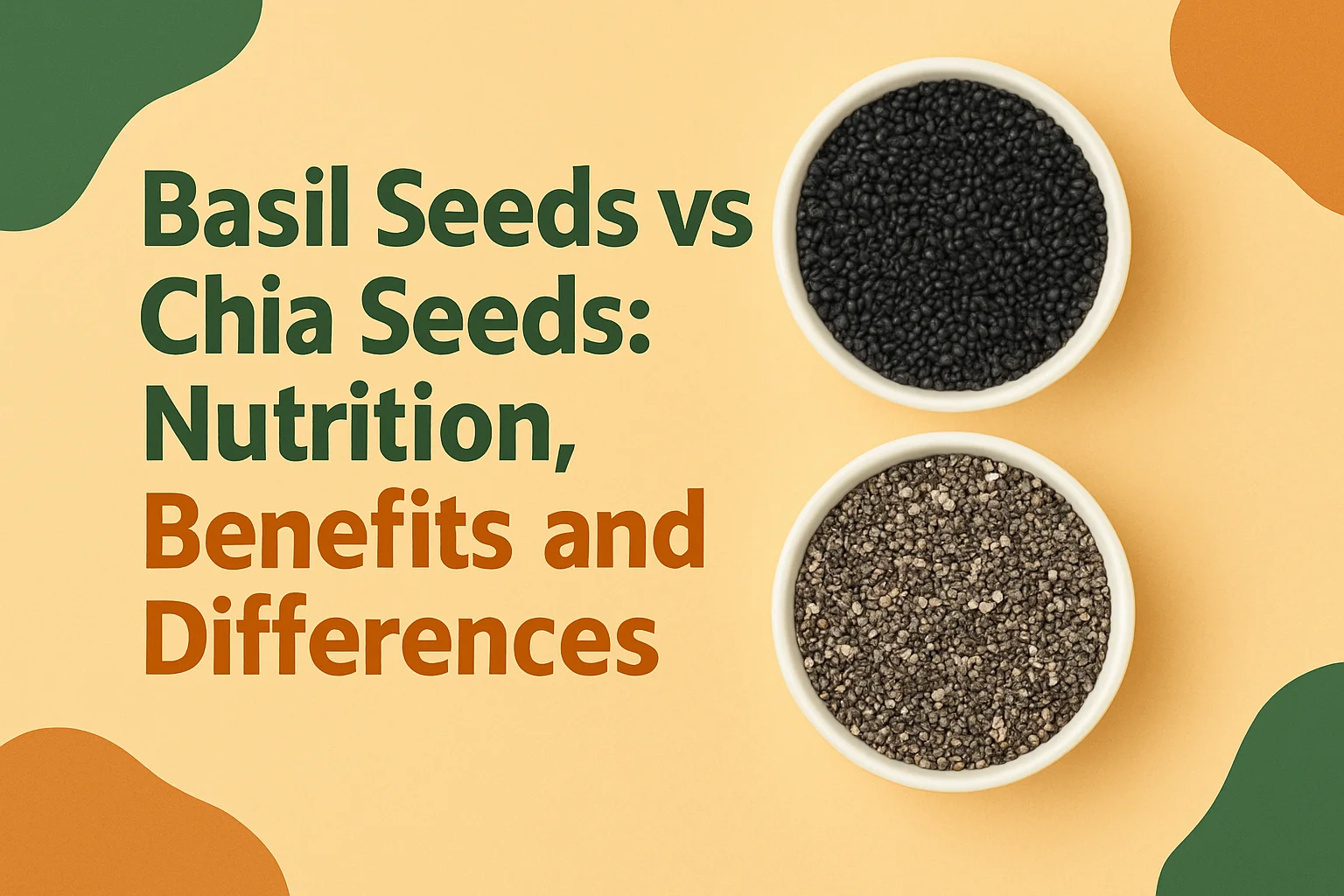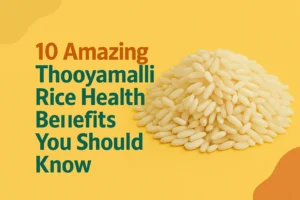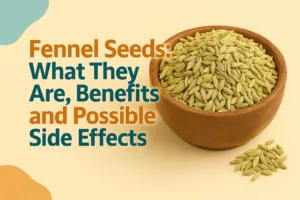In the world of superfoods, basil seeds vs chia seeds has become a common debate especially among those who follow a healthy lifestyle. While both seeds may look similar and are often used in health drinks and puddings, they offer unique nutritional values and benefits that set them apart.
Whether you are aiming for weight loss, better digestion or glowing skin, understanding the basil seeds vs chia seeds comparison can help you make the right dietary choices. In this article, we’ll break down their nutrition facts, health benefits, differences and how to include them in your diet. Let’s dive in.
What Are Basil Seeds?
Basil seeds also known as sabja seeds or tukmaria, come from the sweet basil plant (Ocimum basilicum), commonly used in Indian and Southeast Asian cuisines. These tiny black seeds are traditionally used in Ayurvedic medicine to cool the body, relieve acidity, and promote digestion.
When soaked in water, basil seeds swell and form a jelly-like coating, similar to chia seeds but with a slightly larger size and firmer bite.
What Are Chia Seeds?
Chia seeds are the edible seeds of Salvia hispanica, a flowering plant native to Central America. Once a staple in ancient Aztec diets, these seeds have gained global popularity for their dense nutritional profile.
Like basil seeds, chia seeds also form a gel like texture when soaked in water making them ideal for smoothies, desserts and puddings.
Nutritional Comparison: Basil Seeds vs Chia Seeds
Understanding the nutrition is key when comparing basil seeds vs chia seeds. Here’s how they stack up per tablespoon (approx. 13g):
| Nutrient | Basil Seeds | Chia Seeds |
| Calories | 60 | 69 |
| Protein | 2g | 2.5g |
| Fat | 2.5g | 4.5g |
| Omega-3 Fatty Acids | Low | High |
| Fiber | 7g | 11g |
| Calcium | 15% of RDA | 18% of RDA |
| Iron | 10% of RDA | 12% of RDA |
| Magnesium | Moderate | High |
| Antioxidants | High | High |
Takeaway: Chia seeds are slightly richer in fiber, protein, healthy fats, and omega-3s. Basil seeds, however, are lower in calories and are excellent for quick digestion support.
What are the Health Benefits of Basil Seeds?
1. Helps with Acidity and Digestion
Basil seeds have cooling properties that help soothe the stomach lining. When soaked and consumed they create a mucilaginous gel that can relieve bloating and acidity.
2. Aids in Weight Loss
Their high fiber content helps you feel full longer reducing appetite naturally. Many weight loss diets recommend basil seeds as a pre meal drink.
3. Regulates Blood Sugar
Studies suggest basil seeds may help regulate post meal blood sugar spikes making them beneficial for type 2 diabetics.
4. Promotes Skin Health
The antioxidants in basil seeds may help protect the skin from oxidative stress contributing to clearer and healthier skin.
5. Rich in Iron and Calcium
Iron helps boost hemoglobin levels and calcium supports bone strength, especially useful for vegetarians.
What are the Health Benefits of Chia Seeds?
1. Excellent Source of Omega-3 Fatty Acids
Chia seeds are rich in alpha-linolenic acid (ALA), a plant-based omega-3 that supports heart health and reduces inflammation.
2. Supports Digestive Health
With over 10 grams of fiber per serving, chia seeds aid in smooth bowel movements and help maintain gut flora.
3. Stabilizes Blood Sugar Levels
Chia gel slows down the digestion of carbohydrates, which helps prevent sudden spikes in blood sugar.
4. Boosts Energy and Endurance
Ancient warriors consumed chia for stamina. Its mix of protein, carbs and fats makes it a great energy booster for athletes.
5. Supports Weight Management
The high fiber and protein combination helps control hunger and supports metabolism.
Basil Seeds vs Chia Seeds: Key Differences
Let’s look at the major differences in basil seeds vs chia seeds in a summarized format:
1. Swelling Time
- Basil Seeds:
These seeds swell up very quickly. Within just 5 to 10 minutes of soaking in water they develop a jelly-like coating and are ready to use.
- Chia Seeds:
Chia seeds need a bit more patience. They usually take 20 to 30 minutes (sometimes even longer) to soak properly and become soft and gelatinous.
If your are in a hurry basil seeds are the quicker option!
2. Taste and Texture
- Basil Seeds:
They are tasteless and have a slightly crunchy bite, even after soaking. Great if you don’t want to change the flavor of your drink or dish.
- Chia Seeds:
Chia seeds have a mild nutty flavor and turn into a soft, gel-like texture when soaked. They blend smoothly into puddings and smoothies.
Choose basil seeds for crunch and chia seeds for a smoother texture.
3. Omega-3 Content
- Basil Seeds:
These seeds contain only a small amount of omega-3 fatty acids.
- Chia Seeds:
Chia seeds are rich in omega-3s especially alpha linolenic acid (ALA) which supports brain, heart and joint health.
For a plant-based omega-3 boost, chia seeds are the better pick.
4. Culinary Uses
- Basil Seeds:
Mostly used in traditional Indian drinks like falooda, lemon water or rose sherbet. They’re refreshing and popular during summer.
- Chia Seeds:
Found in puddings, smoothies, oatmeal, yogurt, protein bars and even baked goods like muffins. Very common in Western style healthy recipes.
Basil seeds are perfect for cooling drinks while chia seeds are more versatile in recipes.
5. Shelf Life
- Basil Seeds:
Typically last up to 1 year when stored in an airtight container in a cool place.
- Chia Seeds:
Have a longer shelf life around 2 to 4 years if stored properly.
Chia seeds are better if you want to buy in bulk and store longer.
How to Use Them in Your Diet?
Basil Seeds Recipes
- Sabja Lemonade: Soak 1 tsp of basil seeds in water for 10 minutes. Mix with lemon juice, honey and chilled water.
- Falooda: A traditional Indian dessert with soaked basil seeds, milk, rose syrup, and vermicelli.
- Yogurt Parfait: Add soaked basil seeds to curd with fruit and granola for a refreshing breakfast.
Chia Seeds Recipes
- Chia Pudding: Mix 3 tbsp of chia seeds with 1 cup almond milk, refrigerate overnight, and top with fruits.
- Smoothie Booster: Add 1 tbsp to any smoothie for an instant nutrient upgrade.
- Chia Jam: Combine mashed berries, honey, and chia seeds. Let sit for a few hours until jam-like.
These examples help visualize the practical use of both in daily meals and further simplify the basil seeds vs chia seeds decision.
Which One Should You Choose?
When choosing between basil seeds vs chia seeds, consider your specific health goals:
- Want more omega-3 fatty acids and protein? Go for chia seeds.
- Need something quick-digesting and cooling for summer or acidity? Choose basil seeds.
- For weight loss, both are effective due to their high fiber and appetite-suppressing effects.
Chia Seeds for Weight Loss
Chia seeds expand up to 10 times their weight in water. This bulk in your stomach helps curb appetite and reduce overeating. When combined with exercise and a calorie controlled diet chia can be a valuable ally in weight loss efforts.
Basil Seeds for Digestion
Basil seeds are known in Ayurveda for their digestive and carminative properties. They help cleanse the gut and improve overall digestion, making them ideal after heavy or spicy meals.
Chia Seeds vs Flax Seeds vs Basil Seeds
While flax seeds are rich in lignans and omega-3s, chia seeds win in terms of fiber and ease of use. Basil seeds offer a unique cooling benefit, which flax doesn’t provide.
Safety and Side Effects
While both are generally safe, overconsumption can cause bloating or discomfort.
- Chia seeds: Must be soaked before eating. Dry seeds can expand in the throat and cause choking.
- Basil seeds: Avoid if you’re on blood thinning medication as they may lower blood pressure or interfere with clotting.
Always consult with a healthcare provider if you are pregnant, breastfeeding or on medication.
Also Read: Easy Tips to Stay Healthy Every Day
Conclusion
In the basil seeds vs chia seeds debate, there’s no clear winner, both offer impressive health benefits. Chia seeds are slightly more nutrient dense especially in omega-3s and fiber while basil seeds shine with their cooling, digestion-friendly properties.
Whether you’re aiming for better energy, digestion, weight loss or overall nutrition, both seeds can be added to your diet in tasty and healthy ways.
For the best of both worlds, why not use them together? A chia and basil seed pudding can give you the combined power of ancient superfoods in one bowl.
Frequently Asked Questions: Basil Seeds vs Chia Seeds
1. Can I use basil seeds instead of chia seeds in recipes?
Yes, you can use basil seeds as a substitute for chia seeds in many recipes like drinks and puddings. However, basil seeds swell faster and have a crunchier texture, while chia seeds are softer and more gel-like.
2. Which is better for weight loss: basil seeds or chia seeds?
Both seeds can support weight loss. Chia seeds are higher in fiber and protein, which help keep you full longer. Basil seeds are great for reducing appetite and cooling the body, making them ideal for summer diets.
3. Do basil seeds and chia seeds taste the same?
Not exactly. Basil seeds are mostly tasteless with a slight crunch. Chia seeds have a mild, nutty flavor and a softer texture after soaking.
4. Are there any side effects of eating basil or chia seeds?
When eaten in moderation, both are generally safe. However, consuming too many at once can cause bloating or digestive discomfort due to their high fiber content. Always soak them before eating.
5. Which seed has more nutrients: chia seeds or basil seeds?
Chia seeds are higher in omega-3 fatty acids, calcium, and fiber. Basil seeds also offer good nutrients, especially for digestion and cooling, but chia seeds have a more balanced nutrient profile overall.




